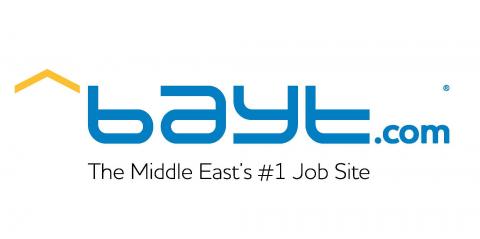

Over 60,000 job applications are submitted on Bayt.com everyday
The most recent “Top Industries in the Middle East and North Africa” survey was just released by Bayt.com, the number one job site in the Middle East, and YouGov, a pioneer in online market research, revealing that more than one in every three (37%) professionals in Lebanon are considering an industry change in the next few months. This is in spite of the fact that only one in four (26%) respondents report having changed industries during the last two years.
The desire to find a new job, switch current career or industry altogether is also translating to heavier online activities. Bayt.com reported that over 60,000 job applications are submitted on the job site every day and over 15,000 new professionals join the Bayt.com platform on a daily basis.
Amongst those considering an industry change in Lebanon, the most appealing industries include business consultancy/ business management (17%), followed by banking/ finance/ accounting (13%), engineering/design (10%), and media/ journalism/ publishing (10%). When asked about their reasons for considering an industry change, the top answers were ‘better salary’ (63%), ‘better career growth’ (43%), and ‘better work-life balance’ (33%). For those who have already changed industries, the most common reasons for having done so were ‘to fulfil my life’s ambition of working in a particular job’ (33%), ‘better salary in the new industry’ (29%), and ‘better career growth opportunities in the new industry’ (25%).
Assessment of Current or Most Recent Industry
According to the survey, the most common industries Lebanon respondents are currently working in or worked in most recently are hospitality/ recreation/ entertainment (11%), real estate/ construction/ property development (10%), and engineering/ design (8%). Of those seeking employment in the MENA region as a whole, the most popular industries are banking/finance/accounting (11%), education/academia (7%), and engineering/ design (7%).
When it came to satisfaction with the current or most recent industries for Lebanon respondents, more than half (55%) said they are satisfied with the working hours, followed by work culture (54%), training and development (47%), and work-life balance (46%).
Most Attractive Industries
When asked about their perception of job attributes in various industries, survey respondents claim that the best salary packages in Lebanon are found in certain industries including banking/ finance/ accounting (31%), and business consultancy/ business management (21%).
According to respondents, banking/ finance/ accounting (26%), government/ civil service (19%), education/ academia, and business consultancy/ business management (both 16%) are among the industries with the best work-life balance, while banking/ finance/ accounting (28%) remains high on the list for having the best career growth opportunities.
Further, among industries perceived to have the most optimum job security are banking/ finance/ accounting (31%), and military/ defense/ police (29%).
For survey respondents, the industries believed to have experienced the strongest growth in banking/ finance/ accounting (32%), hospitality/ recreation/ entertainment (21%), telecommunications (19%), and real estate/ construction/ property development (19%).
“Here in the MENA, we are seeing a collective push towards the diversification of the regional economy and the establishment of a knowledge-based economy in which a highly talented workforce is spread relatively evenly across industries,” said Suhail Masri, VP of Employer Solutions, Bayt.com. “Increasingly, the most attractive industries are defined by factors that include, but extend beyond salary, such as work-life balance, opportunities for career growth, and job security. Today, job seekers are looking for employment in industries that tick every box on their job hunt checklist; and at Bayt.com, we aim to use this information to help employers and job seekers connect more effectively. We have already witnessed a spike in job postings during the first of 2018 by more than 50%. The region’s professionals are also very active on our jobsite, with over 15,000 daily registrations, 60,000 daily applications and CV updates. The market is very dynamic and continues to bring new and more diverse career opportunities that we always make available on Bayt.com.”
In terms of the talent being attracted by various industries, those that are most attractive to women in Lebanon include banking/ finance/ accounting (31%), media/journalism/ publishing (27%), and education/ academia (25%). Meanwhile, industries attracting the most local talent include banking/finance/accounting (30%), and engineering/ design (17%). As for those hiring the largest proportion of fresh graduates in Lebanon, banking/finance/accounting (33%), IT/ Internet/ e-commerce (21%), and military/ defense/ police (19%).
Most Challenging Industries
In Lebanon, respondents perceive the most stressful industries to be media/journalism/ publishing (20%), followed banking/ finance/ accounting (18%).
Among industries perceived to have the longest working hours, hospitality/ recreation/ entertainment (25%), healthcare/ medical services (23%), and military/ defense/ police (18%).
“We can see from this survey that industries are becoming increasingly competitive amongst each other in terms of securing top talent in the MENA,” said Nehal Jibouri, Head of Custom Research, YouGov MENA. “The difference in percentage points between the most and least appealing industries is generally small across the board, indicating that the regional workforce is quite diverse and multifaceted. We are delighted to see this trend emerge as the region evolves to become a global hub for talent and innovation, but this also calls for each individual employer to become more attentive to their branding, workplace, and methods of securing top talent.”
Data for the Bayt.com “Top Industries in the Middle East and North Africa” survey was conducted between 14 February 2018 and 29 March 2018 with 3,561 respondents from the UAE, KSA, Kuwait, Oman, Qatar, Bahrain, Lebanon, Syria, Jordan, Egypt, Morocco, Algeria, and Tunisia.
- Log in to post comments